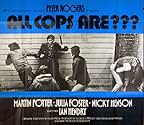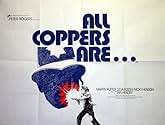Aggiungi una trama nella tua linguaA young policeman and a small-time crook are both involved with the same girl.A young policeman and a small-time crook are both involved with the same girl.A young policeman and a small-time crook are both involved with the same girl.
- Regia
- Sceneggiatura
- Star
Recensioni in evidenza
All Coppers Are... comes across as a slice of life kitchen sink drama of the 1960s. Only it was made in the early 1970s after the worldwide student protest movement of the late 60s.
This was the time when Carry On producer Peter Rogers who also produced this movie started to rebel against the swinging 60s to become a bit of a reactionary.
Set in Battersea. Young policeman Joe (Martin Potter) is married with a baby but gets to have a bit of fun with flighty Sue (Julia Foster) who he met at a party. Joe neglects to mention that he is married and a policeman.
Joe also befriends petty crook Barry (Nicky Henson) who he confesses to about his marital status but no his job.
Barry is also attracted to Sue and they become a couple when they find out more about Joe. Barry is also planning a cigarette warehouse robbery, if only he drove a less conspicuous car. You just know Barry's heist will go wrong and he will come face to face with Joe.
This is story with a thin plot. It was obviously inspired by the French New Wave but it lacks a ballsy approach.
The film's open ended conclusion does it no favours. The protest scene although well filmed seemed to be about nothing apart from young radicals wanting to have a punch up with coppers. It just highlights that the wrong people were involved in the movie as it had no social commentary. Their sympathies were with Barry, being a copper is a hard and dangerous life.
It needed genuine leftist filmmakers to show that times are changing.
This was the time when Carry On producer Peter Rogers who also produced this movie started to rebel against the swinging 60s to become a bit of a reactionary.
Set in Battersea. Young policeman Joe (Martin Potter) is married with a baby but gets to have a bit of fun with flighty Sue (Julia Foster) who he met at a party. Joe neglects to mention that he is married and a policeman.
Joe also befriends petty crook Barry (Nicky Henson) who he confesses to about his marital status but no his job.
Barry is also attracted to Sue and they become a couple when they find out more about Joe. Barry is also planning a cigarette warehouse robbery, if only he drove a less conspicuous car. You just know Barry's heist will go wrong and he will come face to face with Joe.
This is story with a thin plot. It was obviously inspired by the French New Wave but it lacks a ballsy approach.
The film's open ended conclusion does it no favours. The protest scene although well filmed seemed to be about nothing apart from young radicals wanting to have a punch up with coppers. It just highlights that the wrong people were involved in the movie as it had no social commentary. Their sympathies were with Barry, being a copper is a hard and dangerous life.
It needed genuine leftist filmmakers to show that times are changing.
Famed British journeyman director Sidney Hayers is responsible for creating some truly outstanding genre cinema, including razor-edged thrillers 'Revenge', 'Assault' and Peter Wyngarde creepy occult horror classic 'Night of The Eagle', with 'All Coppers Are...' perhaps, being one of the versatile director's more neglected works. It's interesting to see Martin Potter play straight laced copper Joe, since he is better known for more outré performances in Fellini's Satyricon and Julian in the deliciously eccentric psychodrama 'Goodbye Gemini', with the always likeable Nicky Henson on familiar ground as randy small-time villain Barry, with the vivacious, breathtakingly beautiful Julia Foster being the most sympathetic character as boozy, tough-luck, beguilingly buxom bombshell Sue who genuinely falls for handsome, true-blue copper Joe, but somewhat fatefully ends up in the not so loving clutches of gregarious bad boy Barry.
'All Coppers Are...' could be seen as a rather more glum, kitchen sink version of 'Jules et Jim', with Joe, Barry and Sue's brief ménage a trois forming the catalyst for the increasingly dramatic rift between the ill-matched trio. And for the most part Hayers surprisingly gritty 70s drama remains an entertaining watch, having more artistic credibility than mere nostalgia. While the characters are only lightly sketched, the performances are dynamic, with Julia Foster eliciting some earnest pathos, and the peripheral characters are engagingly played by UK film/TV luminaries Ian Hendry, David Essex, Eddie Burn, and Glynn Edwards, even featuring a delightfully churlish cameo by bawdy British B-Movie icon Robin Askwith! My far from subjective fondness for under-represented 70s British cinema means this film is already preaching to the perverted, but it objectively exudes boodles of period charm, a slinky array of nifty outfits, fabulous shots of the city, some quality banter and a genuinely exciting, surprisingly impactful climax.
'All Coppers Are...' could be seen as a rather more glum, kitchen sink version of 'Jules et Jim', with Joe, Barry and Sue's brief ménage a trois forming the catalyst for the increasingly dramatic rift between the ill-matched trio. And for the most part Hayers surprisingly gritty 70s drama remains an entertaining watch, having more artistic credibility than mere nostalgia. While the characters are only lightly sketched, the performances are dynamic, with Julia Foster eliciting some earnest pathos, and the peripheral characters are engagingly played by UK film/TV luminaries Ian Hendry, David Essex, Eddie Burn, and Glynn Edwards, even featuring a delightfully churlish cameo by bawdy British B-Movie icon Robin Askwith! My far from subjective fondness for under-represented 70s British cinema means this film is already preaching to the perverted, but it objectively exudes boodles of period charm, a slinky array of nifty outfits, fabulous shots of the city, some quality banter and a genuinely exciting, surprisingly impactful climax.
This has the feel of the Sweeney and Up the Junction rolled into one, but doesn't really work.
The poster is a real spoiler. It depicts what is going to happen and makes it obvious the way the storyline is going to go.
Julia Foster talks and acts working class, but has a different outfit in every scene.
It's watchable, but nothing more.
The poster is a real spoiler. It depicts what is going to happen and makes it obvious the way the storyline is going to go.
Julia Foster talks and acts working class, but has a different outfit in every scene.
It's watchable, but nothing more.
Not really watchable as entertainment but fairly revealing if we're looking for insight into the varying mindsets of film makers of the time. Peter Rogers, whose company produced this, had put out Carru On Camping a couple of years before. That film had ended with a scene where a bunch of hippies were driven from a field by the film's main protagonists. In other words a victory for the sensible silent majority over the unwashed hordes threatening to corrupt society. It was part of a trend in the later Carry Ons where they became part of a kind of mainstream reactionary backlash against the 'counter culture'. In this film there is a 'protest demo' scene which continues this theme and tries to replicate the same type of battle in a more serious setting and besides being appallingly badly done it is unashamedly biased. Waving a banner about student grants , the protesters isolate a police officer and in cold blood surround him and badly beat him. Because of their grants, presumably. It makes those dreadful old political cartoons by Cummings in the Express look enlightened. Some interesting external shots though.
All coppers are has a lot going for it. Set in gritty London of the 70s. Its the story of 2 men on opposing sides of the law. It features a strong cast and even a fresh faced David Essex. But the it tends to lack the courage of its convictions. Where the story should have been at its strongest the makers seemed to have lacked the courage to carry it through. Also most of the characters are very unsympathetic. The film does have its moments but it could have been so much better.
Lo sapevi?
- QuizThe street riot scenes were all shot on the exterior Baker Street standing set at Pinewood that had been constructed the previous year for the movie Vita privata di Sherlock Holmes (1970). This street appears in other films/TV series shot at Pinewood around this time too, including Il meraviglioso Mr. Blunden (1972), Carry on at Your Convenience (1971), Attenti a quei due (1971) and UFO (1970). Some of the footage of the riot scenes was later re-used for the 1978 episode Look After Annie (1978) of the TV series I professionals (1977).
- Curiosità sui creditiThe lettering in the opening title sequence and the closing caption "The End" was in a handwritten font, to mimic the graffiti used for the film's title "All Coppers Are [Bastards]".
- ConnessioniEdited into I professionals: Look After Annie (1978)
I più visti
Accedi per valutare e creare un elenco di titoli salvati per ottenere consigli personalizzati
Dettagli
- Data di uscita
- Paese di origine
- Lingua
- Celebre anche come
- All Cops Are
- Luoghi delle riprese
- Battersea, London, Greater London, Inghilterra, Regno Unito(apartment block exteriors/various exterior street scenes)
- Aziende produttrici
- Vedi altri crediti dell’azienda su IMDbPro
- Tempo di esecuzione1 ora 27 minuti
- Mix di suoni
- Proporzioni
- 1.66 : 1
Contribuisci a questa pagina
Suggerisci una modifica o aggiungi i contenuti mancanti

Divario superiore
By what name was All Coppers Are... (1972) officially released in India in English?
Rispondi




























